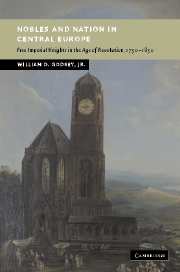Book contents
- Frontmatter
- Contents
- Preface
- Abbreviations
- Introduction
- 1 Wealth and noble autonomy: the Free Imperial Knights in Mainz on the eve of revolution
- 2 Nobles becoming Germans: the transformation of a concept
- 3 Nobles becoming Germans: the destruction of a “geo-cultural landscape”
- 4 Between destruction and survival: knights on the Middle Rhine 1750–1850
- 5 The past recaptured: knights in the Hapsburg Empire 1792–1848
- 6 From cathedral canons to priests: the Coudenhoves and the “Catholic revival”
- 7 The beginnings of conservative German nationalism: the “naturalization” of Baron Carl vom und zum Stein (1757–1831)
- Conclusion
- Appendix: Families of Free Imperial Knights (1797)
- Bibliography
- Index
2 - Nobles becoming Germans: the transformation of a concept
Published online by Cambridge University Press: 01 October 2009
- Frontmatter
- Contents
- Preface
- Abbreviations
- Introduction
- 1 Wealth and noble autonomy: the Free Imperial Knights in Mainz on the eve of revolution
- 2 Nobles becoming Germans: the transformation of a concept
- 3 Nobles becoming Germans: the destruction of a “geo-cultural landscape”
- 4 Between destruction and survival: knights on the Middle Rhine 1750–1850
- 5 The past recaptured: knights in the Hapsburg Empire 1792–1848
- 6 From cathedral canons to priests: the Coudenhoves and the “Catholic revival”
- 7 The beginnings of conservative German nationalism: the “naturalization” of Baron Carl vom und zum Stein (1757–1831)
- Conclusion
- Appendix: Families of Free Imperial Knights (1797)
- Bibliography
- Index
Summary
“Where do we find the true German nation? We certainly do not find it at the Court of princes.”
Justus Möser as quoted in Klaus Epstein, The Genesis of German Conservatism (Princeton: Princeton University Press, 1966), 329.“The familiar view was that nations were natural and perennial; people had a nationality much as they had speech or sight. Clearly, such a view of the nation is untenable. Nations are not perennial; they can be formed.”
Anthony D. Smith, “The Origins of Nations,” chap. in: Geoff Eley and Ronald Grigor Suny, eds., Becoming National: A Reader (New York and Oxford: Oxford University Press, 1996), 109.In an amusing exchange in his novel The Guermantes Way, Marcel Proust recaptured an earlier, pre-revolutionary understanding of nobility. At a tea-party, the old marquise de Villeparisis offered to show one of her guests, a young historian named Bloch, a portrait of her great-aunt, who had been the abbess of a famous collegiate foundation for noblewomen:
she now rang [for the liveried footman] to light up the portrait of the Duchesse de Montmorency, abbess of one of the most famous chapters in the east of France. Everyone had risen. “What is rather amusin',” said our hostess, “is that in these chapters where our great aunts were so often made abbesses, the daughters of the King of France would not have been admitted. They were very exclusive chapters.” “The King's daughters not admitted!” cried Bloch in amazement, “why ever not?” “Why, because the House of France had not enough quarterin’s after that misalliance.” […]
- Type
- Chapter
- Information
- Nobles and Nation in Central EuropeFree Imperial Knights in the Age of Revolution, 1750–1850, pp. 48 - 71Publisher: Cambridge University PressPrint publication year: 2004

